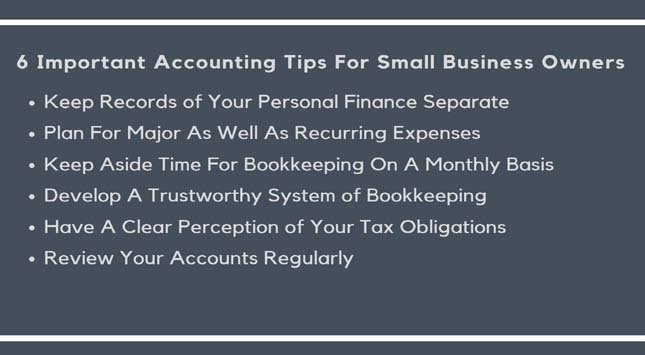Regardless of the size of your business and personnel, for taxation purposes, you are regarded as a business owner. Therefore, you need to maintain a record of your income as well as expenses.
Apart from saving money when the tax season starts, you need to keep clear records of all business transactions to get a clear idea of the exact business activities which are profitable and where you can cut down costs in order to enhance your income.
You can no doubt hire a company which offers Accounting Services to manage your finances, but even then, you need to have a basic understanding of the best practices related to accounting and bookkeeping. So, if you are the owner of a startup, here are some useful accounting tips which you can use to manage your company’s finances efficiently-
Keep Records of Your Personal Finance Separately
In case you run a small company and aren’t making huge profits, you may feel tempted to merge your business and personal finances together. However, research shows that many business owners make the mistake of utilizing the same account for their business and personal transactions.
By having a separate business account, you will be able to maintain your accounts records accurately, avail the benefit of tax reductions and secure a loan for your business. Maintaining your business and personal finances separately will enable you to protect your personal credit score as well as assets in case your business faces any challenges in the future.
Plan for Major as Well as Recurring Expenses
Though it is quite likely that you won’t have to deal with any unexpected expenses periodically, you need to have a clear perception of the major and recurring expenses of your business. This will enable you to plan your annual budget and set aside sufficient money for covering recurring business expenses for at least one month in advance.
Major expenses which you need to plan for include items such as office furniture or a new computer. Recurring expenses, on the other hand, refer to the ones which keep recurring like rent, utilities, travel expenses, insurance, and marketing costs.
Keep Aside Time for Bookkeeping on a Monthly Basis
One mistake which is quite common among many startup owners is that they don’t organize their bookkeeping on a monthly basis. After a time period, they face the challenging task of calculating all receipts and business transactions carried out over a couple of months. Therefore, instead of letting all these receipts and transactions pile up, make it a point to set aside a day every month which you will spend to set your accounts in order.
Develop a Trustworthy System of Bookkeeping

Even if you hire Accounting Firms to handle the major part of your accounting, the responsibility of bookkeeping, which involves maintaining a record of your daily business transactions and reconciling bank statements, will be on you.
Therefore, you will have to develop a reliable bookkeeping system to ensure a high level of accuracy in bookkeeping. In order to make bookkeeping tasks easier for yourself, you can invest in accounting software to help you in areas such as invoicing, time tracking, and expense management. Examples of accounting software that you can consider investing in include Xero, FreshBooks, and QuickBooks.
To run your business efficiently, you need to have a good understanding of the basics of accounts. If needed, take the help of your accountant to gain an understanding of the basics of accounting. Create a checklist of accounting essentials that you need to get familiar with so that you gain a clear understanding of accounting. It will help you to acquire a better picture of the accounting structure of your business.
Have a Clear Perception of Your Tax Obligations
Since you will need to save a sufficient amount of money to pay as taxes for each month, it is essential to understand your tax obligations and what deductions you can claim. As the owner of small business, as per law, you need to maintain records of business records for five years or more.
Therefore, it is essential to find a reliable system for maintaining your financial records. You can take the help of government websites for guidance and information about the exact records that you need to maintain. However, if you have any doubt, it would be wise on your part to hire an experienced accountant to advise you about your rights and obligations as well as deductions that are applicable to specific situations.
Review Your Accounts Regularly
If you are outsourcing accounting to professionals, you need to regularly review your accounts to have a clear idea of its operational status. As a result, the functioning of your business will be clearer and it will be easier for you to find out the areas where there is a scope of improvement and where resource allocation is necessary. At the same time, unscheduled reviewing of accounts will ensure proper bookkeeping maintenance all the time.

